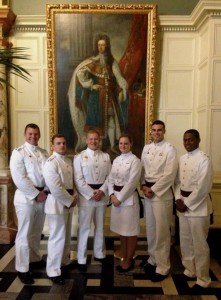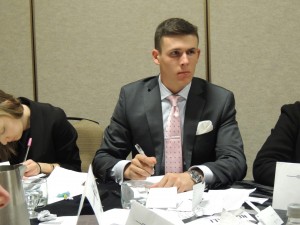So much Model UN literature focuses on subtle tips and tricks when speaking or negotiating, but a delegate’s performance is dependent entirely on preparation. West Point delegates typically conduct their own research beforehand without much preparation as a team and may consult professors as needed.
Brandon Moore, West Point’s Head Delegate, said, “The West Point Model UN team doesn’t conduct any formal training prior to a conference. We have a short meeting where we discuss each cadet’s committee and/or crisis position, but that’s typically the full extent of it. Preparation is entirely the prerogative of the individual team members.”
Besides each individual delegate’s hard work and skill, Moore attributes his delegates’ high success rate to their competitive try-out system. The West Point Model UN team holds try-outs with a written application, interviews with veteran members, and, finally, a general assembly and crisis simulation where veteran members can assess potential team members’ performances. Between 120 and 150 West Point students from all years are interested each fall, with roughly 4 to 6 new team members actually chosen.
Moore said, “Even though we’re logistically limited to a smaller team, it also allows us to ensure that our members can attend as many conferences as possible each semester.”
West Point compliments its competitive try-outs with a competitive conference schedule for the year. They attend and win delegation awards at top domestic and international conference including Oxford International Model UN (OxIMUN), University of Pennsylvania Model UN Conference (UPMUNC), McMUN (hosted by McGill University), Harvard National Model UN (HNMUN), and WorldMUN.
This season, the team has won Best Small Delegation at OxIMUN, UPMUNC, and, most recently, at McMUN this past weekend. The team is excited to attend the conferences mentioned in their typical spring line-up but also to add University of California, Berkeley’s Model UN (UCBMUN).
Finally, delegates from West Point typically field questions from peers on how their military background helps performance. Their answers do not necessarily include specialized knowledge from classes but rather confidence and the ability to act in high-stress situations.
On how these skills translate to committee, Moore explained, “Whether it comes to hastily assembling a voting bloc for during a GA or devising a political maneuver in a crisis, these experiences are often beneficial on the circuit.”
Although the team is a powerhouse on the circuit, the team is known for having fun in and out of committee, which, at the end day, is the most important part of Model UN.
Moore said, “Our first priority is to have a great time on the circuit with our fellow college students, while always working to build strong civilian-military relationships for the future.”
For students and teachers building competitive high school and university teams, paying special attention to delegate selection and ensuring individual preparation are key takeaways from West Point’s top-ranked team.




